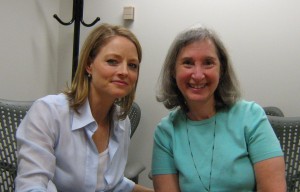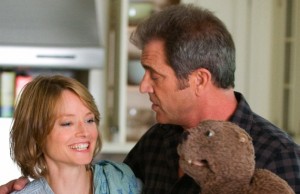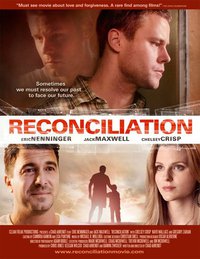Jodie Foster directed and co-stars in “The Beaver,” a movie notorious already for two reasons. First, its script by newcomer Kyle Killen was on top of the famous “black list” of outstanding unproduced screenplays. Everyone knew how smart and distinctive it was and everyone know it would be very tough to film and very tough to find an audience for a story about a severely depressed man who finds that he is able to communicate through a beaver puppet he finds in a dumpster. Second, the lead role of Walter is played by Mel Gibson, whose behavior in the past few years has ranged from volatile to profoundly offensive. But one of Foster’s many outstanding characteristics is her commitment to her work and to her friends. It was a deeply rewarding pleasure to speak with her about the challenges of making this film and what she has learned from the movies and the people she has worked with in making them since she was a child.
Unlike ventriloquists (seen most recently in the documentary, Dumbstruck), Mel Gibson continues to act even when he is “speaking” through the beaver puppet on his hand. Do you as a director intend the other characters on screen and the audience to look at him rather than the puppet?
I was surprised that people didn’t watch the puppet more. I liked that about it. I never wanted the audience to forget that there was a man behind the puppet. It was a widescreen format. We used an anamorphic lens, and that allows you to do two things. First, it lets you keep two people in the frame almost all the time, even in close-up. And with depth of field you can switch the focus very quickly from the front of the frame, where the puppet is, to where he is, so there’s a real distinction to the field that allows you to keep them in the same frame at all times in the beginning of the film and yet separate them emotionally. We’re always, always following Walter’s path. Then, as time goes on, we change that and allow the beaver to start taking over about halfway through the movie.
It seems to me that making a film is a little bit like having a puppet on your hand. Instead of telling your story through one imaginary character, you’ve got many.
Yes, that’s pretty accurate. It’s not just the director’s and the actor’s voice but the writer’s, the costume designer’s, the props, production design. They’re all different languages and each one contributes to telling this one story. There are other experts and you make decisions.
Tell me about how you worked with the costume designer to tell the story.
I’ve made many movies with Susan Lyall. I love her stuff because it’s really real. She spends a lot of time combing through vintage stores and looking through bins. She didn’t come up through theater, so she doesn’t do draping and all that stuff. She has a little bit of a different bent and I think it is more authentic. The idea that there is this perfect icon, valedictorian and a cheerleader — that’s just a delusion. Not only do they not exist, but when it appears they do, there’s a whole other side to them. So for the character played by Jennifer Lawrence, at first she has a lot of make-up and that perfect WASP-y cheerleader outfit. But as you get to know her — as Porter gets to know her, she changes and becomes a deeper and truer person and becomes more informal.
 Your cast is one of the movie’s great strengths, including Jennifer Lawrence, nominated last year for an Oscar for her role in “Winter’s Bone” and soon to star in the big budget film of “The Hunger Games” and the brilliant theater actress Cherry Jones. How did you select them?
Your cast is one of the movie’s great strengths, including Jennifer Lawrence, nominated last year for an Oscar for her role in “Winter’s Bone” and soon to star in the big budget film of “The Hunger Games” and the brilliant theater actress Cherry Jones. How did you select them?
I’m always trying to get Cherry in movies. I love her. Anton Yelchin is also amazing and really shares the screen with Mel. Casting is a long process for me. I take a lot of time. Some people you know right away. Anton I knew right away. I met with some other actors but I was never serious about anyone but him. I’d seen a lot of his work. I knew that he could handle the wit, the lightness of the character but also had the dramatic side. Plus, he looks like a combination of Mel and me so I was pleased about that! I knew he could hold the screen with Mel even though they don’t have many scenes together, just one at the end of the movie. The rest of the time they are fighting each other from opposite corners. I spend a lot of time just making sure that it’s true. There’s really nothing else you can ask.
Everybody reads for me. I was never weird about that. I never minded coming in and reading. They should know if I’m the right person and I should know if I want to do a movie. Some of it is just to hear it. When I’m casting I’m still in the process of figuring out what the movie’s about, making decisions about locations, photography, and all that. When I can hear it, either around a table or at an audition, then I can really see how things are going to work. If I don’t get that process with the actors I’m walking into a mystery and I don’t want to do it.
You have quite a challenge in having a clinically depressed person as your main character. Even more than other illnesses, depression makes a person inaccessible and disturbing.
The world is littered with movies about people that are depressed that either did not come out or are not successful. I read this article in the New York Times that I thought was so smart about obsessive ruminators. It’s a real phenomenon. I thought, “I do that!” People who are good artists don’t just type it into the typewriter and win the Pulitzer Prize. It takes a lot of rumination and thought, a lot of time thinking, “Why did that happen that way?” “How do those two things fit together?” and waking up at 3 in the morning to think about it. It’s a very depressive process. You go over and over and over drama and it can be depressing and isolating. But you come out the other side. And people who don’t, who just go to the beach and play volleyball to cope with their problems don’t get to the other side of their issues. So I see it as a gift, and essential for being an excellent artist. But it does make you alienated from the rest of the population.
There’s a very delicate structure to the film. We start out inside Walter’s head. He’s so lost at that point he’s not even speaking. The beaver is speaking for him. It’s a light, witty, but removed voice. It’s remote. And that gets you through the first part of the movie. And then when he starts to want to live again, you get that burst of vitality. It really isn’t until the second half when reality sets in and the drama begins.
Is the puppet’s accent another way for him to be separate from Walter?
Yes. Walter wants the beaver to be everything that he’s not — charming, quick-witted, blue-collar, decisive. The beaver is somebody who is a leader.
There’s a fairy tale quality to the movie — the narration and the quick turn-around in Walter’s business.
It’s a fable. It’s a dark fable at times. I don’t see anyone walking around with a puppet on his hand in real life. Puppet therapy is very common for children. It’s not something that adults take on. It should be seen as a fable, carrying through to the ending as well.
It’s a fable in its facts but the underlying theme of finding a way to take a break from your negative elements is psychologically valid and dramatically compelling.
He adopts a survival tool. People who go through tragic circumstances where they don’t have another option adopt a survival tool and any therapist will tell you it’s a good thing. But you adopt and adapt these survival tools as a child — at a certain point, when you grow up, they can start to kill you. You have to amputate them. You have to get rid of your survival tool or it will take you over and destroy you.





